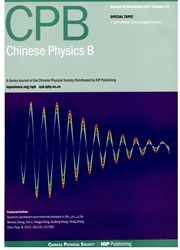

 中文摘要:
中文摘要:
Quantum walks act in obviously different ways from their classical counterparts, but decoherence will lessen and close this gap between them. To understand this process, it is necessary to investigate the evolution of quantum walks under different decoherence situations. In this article, we study a non-Markovian decoherent quantum walk on a line. In a short time regime, the behavior of the walk deviates from both ideal quantum walks and classical random walks. The position variance as a measure of the quantum walk collapses and revives for a short time, and tends to have a linear relation with time. That is, the walker’s behavior shows a diffusive spread over a long time limit, which is caused by non-Markovian dephasing affecting the quantum correlations between the quantum walker and his coin. We also study both quantum discord and measurement-induced disturbance as measures of the quantum correlations, and observe both collapse and revival in the short time regime, and the tendency to be zero in the long time limit. Therefore, quantum walks with non-Markovian decoherence tend to have diffusive spreading behavior over long time limits, while in the short time regime they oscillate between ballistic and diffusive spreading behavior, and the quantum correlation collapses and revives due to the memory effect.
 英文摘要:
英文摘要:
Quantum walks act in obviously different ways from their classical counterparts, but decoherence will lessen and close this gap between them. To understand this process, it is necessary to investigate the evolution of quantum walks under different decoherence situations. In this article, we study a non-Markovian decoherent quantum walk on a line. In a short time regime, the behavior of the walk deviates from both ideal quantum walks and classical random walks. The position variance as a measure of the quantum walk collapses and revives for a short time, and tends to have a linear relation with time. That is, the walker’s behavior shows a diffusive spread over a long time limit, which is caused by non-Markovian dephasing affecting the quantum correlations between the quantum walker and his coin. We also study both quantum discord and measurement-induced disturbance as measures of the quantum correlations, and observe both collapse and revival in the short time regime, and the tendency to be zero in the long time limit. Therefore, quantum walks with non-Markovian decoherence tend to have diffusive spreading behavior over long time limits, while in the short time regime they oscillate between ballistic and diffusive spreading behavior, and the quantum correlation collapses and revives due to the memory effect.
 同期刊论文项目
同期刊论文项目
 同项目期刊论文
同项目期刊论文
 Realization of Single-Qubit Positive-Operator-Valued Measurement via a One-Dimensional Photonic Quan
Realization of Single-Qubit Positive-Operator-Valued Measurement via a One-Dimensional Photonic Quan Irreversibility of a quantum walk induced by controllable decoherence employing random unitary opera
Irreversibility of a quantum walk induced by controllable decoherence employing random unitary opera 期刊信息
期刊信息
